Studying abroad offers unparalleled opportunities for students seeking academic and professional advancement. Materials Engineering is one of the specific and popular fields for international students aiming to migrate for education. Given the technological advancements in areas such as nanomaterials and biomaterials, studying at the best Materials Engineering universities worldwide provides an exceptional chance to acquire knowledge, make scientific progress, and benefit from advanced educational facilities. These top universities offer advanced research-based programs that help students build a better future.
To gain admission to the best Materials Engineering universities, students need to meet certain application requirements, such as high grades and a strong academic and research resume. Despite these conditions, studying Materials Engineering abroad, with its specialized educational facilities and research opportunities, can be a successful path toward a bright future. In this article from Elm Vira Immigration Group, we will explore more about studying Materials Engineering abroad.
Introduction to Materials Engineering Abroad
Materials Engineering is a vital branch of engineering that focuses on the use of materials in manufacturing processes across various industries. This field involves studying and applying various materials, from raw materials to the most complex chemical and physical compounds, in product design. In general, Materials Engineers must have extensive knowledge of all stages of the production process, from raw materials to final products. These specialists frequently collaborate with engineers from other disciplines, such as electrical, chemical, and mechanical engineering, to create high-quality and efficient products.
Additionally, nuclear and aerospace engineers work closely with Materials Engineers to design and develop products for unique environments and specific conditions. The development of new and functional materials has been one of the greatest industrial achievements, historically contributing to the improvement of human growth, well-being, security, and life quality.
Innovations in material production across various engineering fields such as civil, chemical, construction, nuclear, aerospace, agricultural, mechanical, biomedical, and electrical engineering open new horizons in modern technologies. Materials Engineers are at the core of these advancements and innovations. Studying Materials Engineering abroad enables students to leverage scientific progress and emerging technologies, engage in research and development in diverse fields, and enhance their skills in this domain.
Read more: Petroleum Engineering Abroad 2024 | Documents + Scholarships
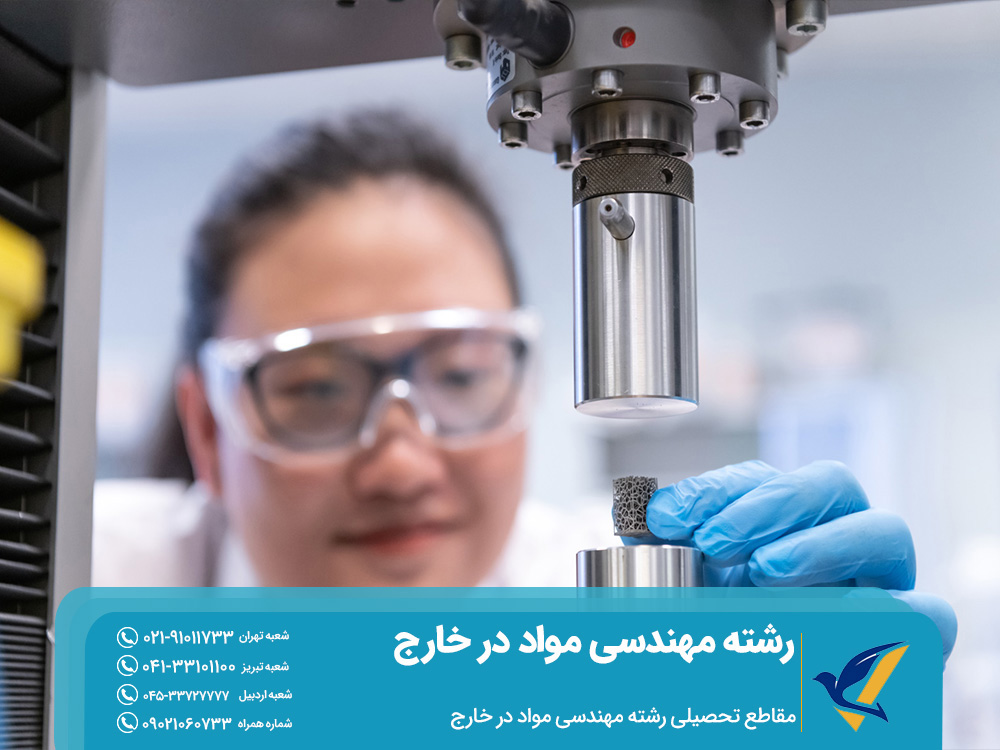
Academic Levels in Materials Engineering Abroad
In Materials Engineering abroad, studies at various academic levels help students specialize at different stages and develop both scientific and practical skills. The academic levels in Materials Engineering abroad include bachelor’s, master’s, and doctoral degrees. Studying at each of these levels at the best Materials Engineering universities worldwide, based on global university rankings, plays a significant role in shaping the knowledge and skills of materials engineers.
1. Bachelor’s Degree in Materials Engineering
Studying for a bachelor’s degree in Materials Engineering abroad allows students to become familiar with the scientific and practical foundations of the field and specialize in various aspects of Materials Engineering. This level serves as a crucial step in building the necessary knowledge and skills for entering the job market and working in industries related to Materials Engineering. In the early years of the bachelor’s program, students focus more on learning fundamental subjects. These courses include topics such as general chemistry, physics, mathematics, and basic engineering principles, which help create a strong scientific foundation in Materials Engineering.
After this introductory period, the focus shifts to more specialized and applied subjects. One of the key aspects of studying for a bachelor’s degree at the best Materials Engineering universities is practical experience. Internships and laboratory projects play a very important role at this level. These opportunities allow students to familiarize themselves with industrial equipment and practical techniques and gain valuable experience in material testing and analysis.
To apply for a bachelor’s degree in Materials Engineering abroad, applicants must have a high school diploma or its equivalent (GED) and provide strong scores on standardized tests such as the SAT or ACT. Specialized courses covered at this level include the mechanical behavior of materials, composite materials mechanics, materials characterization, and studying material deformation and properties. These courses help students gain a deeper understanding of how various materials behave and interact under different conditions.
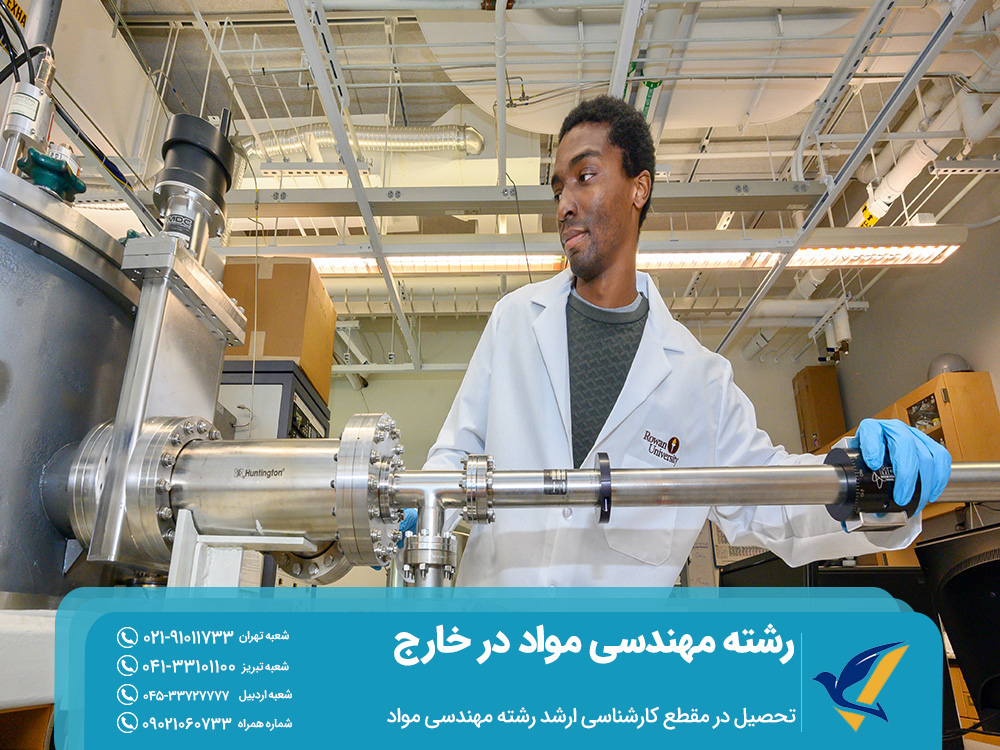
2. Master’s Degree in Materials Engineering
Studying for a Master’s degree in Materials Engineering abroad provides students with the opportunity to delve deeper and specialize further in research and study within the field. While many Materials Engineering jobs require only a bachelor’s degree, obtaining a master’s degree and engaging in specialized research is essential for certain professional and research positions. Students pursuing a Master’s in Materials Engineering typically choose this path after completing their bachelor’s to explore specialized topics and enhance their research skills.
At this level, students focus on studying and designing new materials, conducting complex experiments, and researching various areas within Materials Engineering. Master’s programs in Materials Engineering at the best Materials Engineering universities worldwide typically take two years to complete and are divided into two main options: thesis and comprehensive exams.
In the thesis option, students are required to conduct independent research and present their findings in the form of a scientific thesis. In the comprehensive exam option, students must pass specialized exams to obtain their master’s degree. During this phase, students can choose one of the subfields of Materials Engineering based on their interests and career goals. These subfields include:
- Metals and Ceramics
- Polymers and Composites
- Materials for Nanotechnology
- Materials for Biomedical Applications
To apply for a Master’s in Materials Engineering, applicants should have strong GRE scores and a solid academic background in foundational subjects such as physics, chemistry, and mathematics.

3. Ph.D. in Materials Engineering
Pursuing a Ph.D. in Materials Engineering abroad primarily focuses on advanced and specialized research, allowing students to work as independent researchers and experts in various fields of Materials Engineering. This stage represents the final phase of academic education in this field. Ph.D. students typically engage in deep and creative research projects that lead to significant advancements in materials science and technology, as well as improvements in industrial products and processes.
To apply for a Ph.D. in Materials Engineering abroad, students must hold a Master’s degree in a related field and have strong GRE scores. Some Ph.D. programs may require a specific entrance exam to evaluate the scientific and research abilities of applicants. These exams help universities select students with high academic and research potential.
Ph.D. students, in addition to conducting independent research, may also participate in teaching undergraduate and Master’s-level courses, mentoring younger students. Ph.D. programs generally include specialized courses, scientific seminars, and research workshops designed to enhance the research and scientific skills of students.
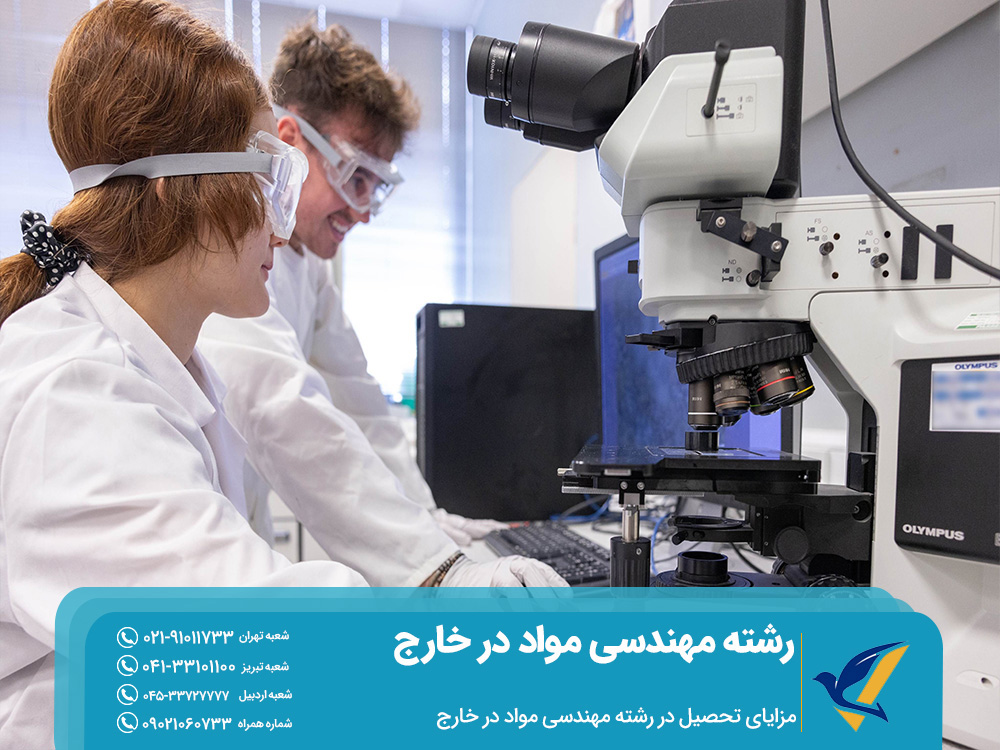
Benefits of Studying Materials Engineering Abroad
Studying Materials Engineering abroad offers numerous advantages that can significantly contribute to students’ academic and professional growth. By studying Materials Engineering abroad, you can benefit from advanced educational facilities, international experiences, and broad career opportunities.
One of the main benefits of studying Materials Engineering abroad is the opportunity to attend some of the world’s top Materials Engineering universities, which offer advanced educational and research programs in this field. These universities, equipped with modern facilities, renowned professors, and diverse research opportunities, provide students the chance to specialize in various areas of Materials Engineering. Studying Materials Engineering abroad also allows students to experience different cultures and gain broader international exposure in the field.
Additionally, studying Materials Engineering abroad opens up numerous job opportunities for students. Another key benefit is access to advanced resources and technologies. The leading Materials Engineering universities worldwide have access to cutting-edge technologies and research equipment, helping students conduct research using the most advanced tools and techniques.
Overall, studying Materials Engineering abroad allows students to work on international research projects and contribute to the latest scientific advancements. These experiences help students become familiar with the most up-to-date methods and achievements in the field of Materials Engineering and contribute to global scientific and industrial progress.
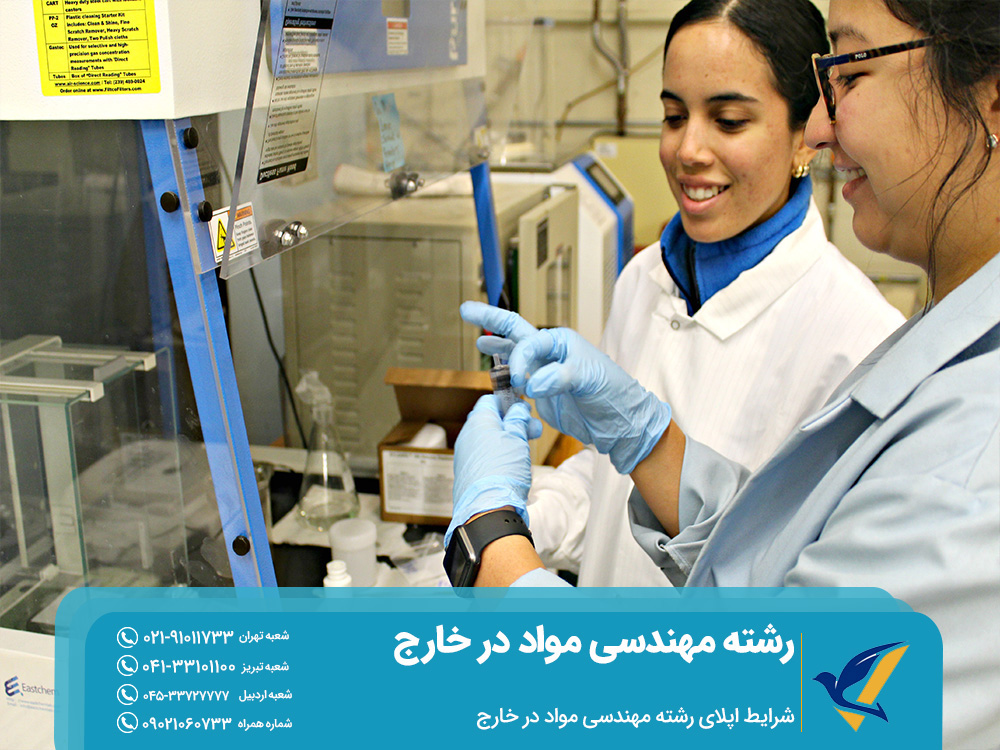
Conditions for Applying to Materials Engineering Programs Abroad
To gain admission to the best Materials Engineering universities worldwide, students must meet specific conditions and requirements. One of the key prerequisites is holding a valid academic qualification in a related field. For undergraduate studies, applicants need to provide a valid high school diploma or an equivalent certificate. Additionally, for postgraduate programs (Master’s and PhD), standardized test scores such as SAT, ACT, or GRE are typically required. High scores on these exams demonstrate the applicants’ academic abilities in fields related to Materials Engineering.
For those applying to higher education programs in Materials Engineering, it is necessary to submit relevant academic and research credentials. Another important requirement is a well-prepared resume that highlights academic achievements, research experience, and skills. Proficiency in English or the language of the country where the program is offered is crucial. Applicants must submit language proficiency scores, such as TOEFL or IELTS.
By meeting these requirements and submitting the necessary documentation, applicants can enhance their chances of being accepted into top global Materials Engineering programs and pursuing their studies abroad.
Tuition Fees for Materials Engineering Abroad
The cost of studying Materials Engineering abroad depends on several factors and can vary significantly from one country to another and from one university to another. Tuition fees for Materials Engineering programs are typically one of the largest expenses. These fees vary based on the type of university (public or private), its geographical location, and its academic reputation. Generally, well-established and prestigious universities may charge higher tuition fees.
Overall, the cost of studying Materials Engineering abroad can vary, and students must consider all financial aspects before making a final decision. Careful planning and research on financial options can help students manage their expenses effectively and take advantage of international educational opportunities.

Top Scholarships for Studying Materials Engineering Abroad
Materials Engineering is a highly sought-after field due to its wide range of applications across various industries. Many developed countries offer numerous scholarship opportunities for outstanding students to help reduce the cost of studying in top Materials Engineering universities worldwide. To secure a scholarship in Materials Engineering abroad, having a strong academic resume is essential.
In addition, having a high GPA from previous academic levels and a valid language proficiency certificate with top scores significantly increases your chances of receiving scholarships, particularly in countries like Turkey. Top Materials Engineering universities worldwide offer a variety of scholarships that cover both tuition fees and living expenses.
When applying for scholarships, it is essential to start early—preferably during your undergraduate studies—to gain experience, build your resume, and enhance your chances of securing a scholarship. Each scholarship has specific conditions and guidelines, so applicants must carefully read and comply with them to benefit from these opportunities and pursue their studies at leading universities.
Job Market and Salary for Materials Engineers Globally
The job market for Materials Engineering is vast and diverse, offering numerous job opportunities in various industries. Materials engineers can work in traditional fields such as aerospace and newer sectors related to the latest scientific and medical advancements. They can be employed in industries such as steel production, automotive manufacturing, aerospace, oil and petrochemical, and even biomedical fields. Factors like geographical location, educational level, job position, overtime hours, and individual skills influence the salary of materials engineers.
Increasing skills in areas like chemistry, polymer materials, precise analysis, and computer usage can boost the income of these engineers. The more certifications, degrees, and technical skills you have, the higher your chances of working in better-paying companies. Materials engineers can work in a wide range of sectors, including power plants, oil and gas companies, missile manufacturing, cement production, transportation, and even biomedical research.
Studying Materials Engineering abroad offers high earning potential. In advanced countries such as the USA and Australia, the job market for Materials Engineering is much broader, and the salaries for materials engineers are significantly higher than in countries like Iran.
The average salary for a materials engineer with little experience in the USA is about $61,420, while an experienced materials engineer can earn around $94,962 annually. These figures vary based on the industry in which the engineer is employed. Many materials engineers also engage in research, publish scientific papers, or work as university professors. This illustrates the diverse and wide-ranging opportunities available in the global Materials Engineering job market.

Best Materials Engineering Universities in the World
Studying Materials Engineering abroad offers a unique opportunity for students to achieve the highest level of knowledge and expertise in this field. Choosing the right university for studying Materials Engineering can have a significant impact on an individual’s professional and academic future. Top universities in Materials Engineering around the world provide advanced educational programs, modern research facilities, and extensive industrial collaborations that prepare students to tackle the complex challenges of the engineering world.
These universities not only provide a rich environment for learning and research but also offer opportunities for professional and personal development through prominent faculty and international networks. Some of the best universities in the world for Materials Engineering include:
- Massachusetts Institute of Technology (MIT)
- Stanford University
- Nanyang Technological University
- Tsinghua University
- University of Cambridge
- University of California, Berkeley
- École Polytechnique Fédérale de Lausanne (EPFL)
- Harvard University
- University of Oxford
- Imperial College London
- National University of Singapore
Materials Engineering in China
Materials Engineering in China holds a special place due to significant investments in research and industry. The best Chinese universities offer advanced and up-to-date programs and provide an ideal environment for international students seeking to study this field. Chinese universities, equipped with modern laboratories and research facilities, allow students to engage in important and practical research projects. Furthermore, the close collaboration with various industries provides ample internship and job opportunities for graduates in Materials Engineering.
China’s job market for Materials Engineers is also vast and diverse. Given the rapid growth of advanced industries and the demand for innovative and sustainable materials, Materials Engineers in China can work in various sectors such as electronics, automotive, aerospace, and biomaterials. Additionally, China’s geographical location and proximity to Asian markets offer many job and business opportunities for graduates in this field.
Studying Materials Engineering abroad allows students to experience life and study in one of the most populous and advanced countries globally. Students benefit not only from high-quality education and research but also from extensive professional and international networks, which can play a crucial role in their future careers.
Top Chinese Universities for Materials Engineering:
- Tsinghua University
- Peking University
- Fudan University
- Shanghai Jiao Tong University
- University of Science and Technology of China (USTC)
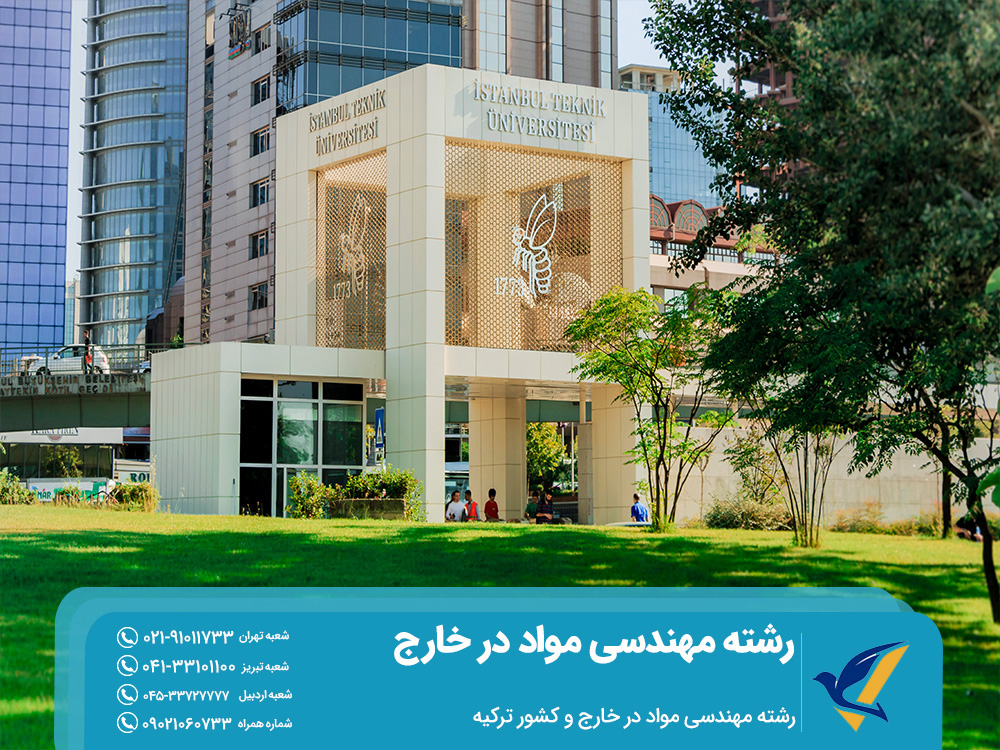
Materials Engineering in Turkey and Abroad
With Turkey’s technological advancements in recent years, the demand for Materials Engineers has significantly increased. Materials Engineers in Turkey hold an important position, enjoying good income prospects and a broad job market. Furthermore, the opportunity to study Materials Engineering abroad at the best Turkish universities is appealing due to their low tuition fees and scholarship opportunities, with some tuition fees being less than $500 per year for international students. This has led to a rising demand for studying and working in the field of Materials Engineering in Turkey in recent years. Turkey offers numerous opportunities for attracting international students from around the world.
For example, most universities in Turkey offer courses in English, especially at the graduate level, making it an attractive destination for international students. The tuition fees for international students at most public universities in Turkey are typically less than $1000 per year. In contrast, private universities may charge between $10,000 and $20,000 annually. Additionally, graduate students can work part-time alongside their studies with their student visas.
Having a relevant resume, including internship experience, significantly improves the chances of receiving a job offer after graduation in Turkey. Prospective students wishing to study Materials Engineering abroad must pass the entrance exams for Turkish universities. The entrance exams for undergraduate programs are the MYOS, and for graduate programs, they are the ALES and GRE.
Top Universities in Turkey for Materials Engineering:
- Istanbul Technical University (ITU)
- Middle East Technical University (METU)
- Sabancı University
- Koç University

Materials Engineering in Russia
Materials Engineering in Russia offers excellent opportunities for international students, including Iranians. Every year, many individuals migrate to Russia for study and work in this field due to the affordable tuition fees and various scholarship options available. The possibility of taking Russian language courses before starting the program and the option to work while studying are additional benefits that make Russia an attractive destination for Materials Engineering students. One of the key scholarships in Russia is the Russian Government Scholarship, which is awarded to international students through the state examination (EGE) and covers all tuition and living expenses.
Russian universities are known for their high-quality technical education and advanced Materials Engineering programs. Many of these universities are recognized by Iran’s Ministry of Science, allowing students to return to Iran after completing their studies and pursue employment. Additionally, the acceptance process is made easier as there are no challenging entrance exams for many Russian institutions.
Students can initially take Russian language courses and then apply for the Materials Engineering program. The average tuition fee for Materials Engineering in Russia is around $2,600 per year, especially for programs in the Russian language. Students can pursue undergraduate, master’s, and doctoral degrees in this field. Additionally, students are allowed to work 10 to 20 hours per week with a work permit. Mastery of the Russian language opens up more job opportunities.
Top Universities in Russia for Materials Engineering:
- Ural Federal University
- Saint Petersburg State University
- Lomonosov Moscow State University
- National Research Nuclear University (MEPhI)
- Tomsk Polytechnic University
- Novosibirsk State University
Conclusion
Materials Engineering, as a core foundation for industrial and technological development, provides unique opportunities for study and advancement abroad. By choosing to study at the best Materials Engineering universities worldwide, students gain access to high-quality education and advanced research. These universities offer diverse and advanced programs that equip students with the necessary skills to enter the global job market. The application process for Materials Engineering abroad typically requires relevant academic documents, scores from standardized tests like GRE, English proficiency tests (e.g., TOEFL or IELTS), and a strong academic and research resume.
Moreover, having relevant practical and research experience can enhance the chances of admission in Materials Engineering programs abroad. There are also various scholarships available for international students, which can significantly reduce tuition and living costs. With a broad and diverse job market in various industries, Materials Engineering graduates will have ample job opportunities globally.
Studying Materials Engineering abroad can be a significant step towards a successful and bright future. With the help of Elm Vira’s migration group, you can benefit from our expert consultations and easily obtain admission to your desired university in Materials Engineering. Additionally, Elm Vira offers special services, including one year of free support. To learn more about the study conditions abroad and get information, visit our free consultation section.
میانگین امتیازات 5 از 5
Vote count: 1 Vote